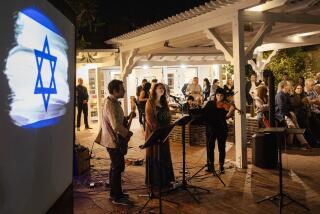Bay Area Afghans Back Strikes
- Share via
FREMONT, Calif. — Decrying last month’s terrorist attacks on the East Coast, leaders of the nation’s largest Afghan expatriate community on Wednesday urged decisive strikes against the perpetrators and the Taliban government in their homeland.
But at the same time, they expressed hope that President Bush would avoid a full-scale war that would threaten the lives of innocent Afghans.
For the record:
12:00 a.m. Oct. 11, 2001 FOR THE RECORD
Los Angeles Times Thursday October 11, 2001 Home Edition Part A Part A Page 2 A2 Desk 1 inches; 26 words Type of Material: Correction
Afghan deaths--An Oct. 4 article on Afghan American reaction to the Sept. 11 terrorist attacks misstated the number of Afghans killed fighting Soviet occupation. About 1 million died.
“Islam is a religion of peace, not terror,” said Farid Younos, a researcher in Islamic studies who for a decade has hosted an Afghan TV talk show in the Bay Area. “Those who committed terrorism and harbor terrorists on Afghan soil made a grave mistake.”
Younos and four other Afghan leaders spoke during a news conference convened by the Afghan Coalition, a Bay Area organization that assists immigrants from the embattled nation thought to harbor suspected terrorist mastermind Osama bin Laden.
Northern California is home to about half the nation’s 100,000 Afghan Americans, many of them well-educated professionals living in Fremont and other cities on the Bay Area’s eastern shore.
Standing beside an American flag at Afghan Coalition headquarters in the Fremont Family Resource Center, speakers repeatedly expressed their sorrow and horror over the attacks on the World Trade Center and the Pentagon. They pledged their support for efforts by the United States and its allies to uproot terrorism and free their homeland from the iron grip of the Taliban. They expressed particular ire over the regime’s treatment of women.
While voicing understanding of the anti-Islam backlash that has rippled across the United States, they expressed hope that Americans will resist responding in a way that they say would play into the hands of the terrorists by sowing the seeds of internal dissent.
And they noted that the U.S. and Afghanistan stood together little more than a decade ago in the fight against communism.
In the last days of the Cold War, Afghans, helped by U.S. military aid, pushed out Soviet troops in 1989, ending a 10-year occupation.
“We lost 2 million people [in the cause] of freedom,” Younos said.
Waheed Momand, president of the Afghan Coalition and a member of the Afghan government before the Soviet occupation, suggested that the use of wide-scale American ground forces in the battle against terrorism could backfire.
“A big ground war is what the terrorists want,” Momand said. “They want Afghanistan to become another victim of terrorism.”
Younos said that while many Afghan Americans oppose the Taliban, they hope any military strikes focus on strategic targets and avoid innocent civilians.
“They hit our Pentagon; let’s strike the Taliban’s equivalent to the Pentagon,” Younos said. “They wanted to hit our Capitol Hill; let’s hit their Capitol Hill.”
Such a “clear war,” Momand said, would avoid igniting the sort of widespread “holy war” that Americans fear most.
Once rid of the terrorists and the Taliban, the Afghan people should be given the economic support they need to rebuild the war-ravaged country, Momand said. The Soviet occupation left Afghanistan with 2 million dead, a million amputees, 6 million refugees and 30 million land mines.
The U.S. failed to aggressively help overcome postwar burdens, he said, and the Taliban rose up in that vacuum with the aid of neighboring Pakistan. Afghanistan became “a body without a brain,” Momand said, adding that the United States “forgot its obligations to the people” who fought on the front lines against communism.
Momand said Afghan Americans generally support the idea of Mohammed Zahir Shah, the nation’s 86-year-old former monarch, returning as a transitional figure until a democracy can be established.
But the idea of democracy is a more elusive notion for civilians within the war-torn country, Momand said. “They just want something to eat. To them, democracy is a luxury.”
Rona Popal, executive director of the Afghan Women’s Assn. International, said that starvation and health problems now pose daunting problems in the impoverished nation under the shadow of war, particularly for women and children.
Popal said she has been trying for years to focus attention on the oppression of women in Afghanistan. But the media and American politicians, she said, began listening only after the events of Sept. 11.
Momand said Afghans in the Bay Area and elsewhere have taken steps they hope will ease some of the tension in the U.S. They include talks at schools, community round-tables and counseling for immigrants fearful for their lives.
Numerous hate crimes directed at immigrants have been reported since the terrorist attacks, ranging from harassment of Muslim students to the slaying of a Sikh immigrant in the Central Valley.
Humah Bargzie, a recent college graduate who has been in the United States since age 7, said she has experienced discrimination recently like never before. Often it is simply a look of disfavor, she said, or rude gestures on the freeway.
Many Muslims also worry about becoming targets of law enforcement profiling. Younos said he hoped the FBI and other police agencies will work aggressively to root out terrorists, but make sure they have a good case before pouncing on a suspect.
“Just because he has a beard or a turban,” Younos said, “doesn’t mean he’s a terrorist.”
More to Read
Sign up for Essential California
The most important California stories and recommendations in your inbox every morning.
You may occasionally receive promotional content from the Los Angeles Times.










